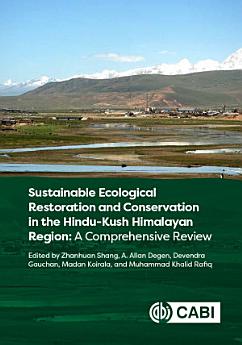Sustainable Ecological Restoration and Conservation in the Hindu Kush Himalayan Region: A Comprehensive Review
About this ebook
About the author
Zhanhuan Shang is a full professor at College of Ecology, Lanzhou University, China. His research interests include ecological restoration, grassland management, rural sustainable development, carbon management, biodiversity on the Tibetan plateau. He has more than 200 publications in international and Chinese journals and books.
A. Allan Degen is an emeritus professor at Ben-Gurion University, Beer Sheva, Israel. He does research on livestock production under harsh conditions and has co-operated in projects in Kazakhstan, Uzbekistan, Nepal, Ethiopia, Afghanistan, Kenya, South Africa and China. He has authored or co-authored 16 books or chapters and over 220 publications in peer-reviewed journals.
Devendra Gauchan is an Agricultural Economist, specializing in Agricultural Economics, Agrobiodiversity conservation, Farming systems and Agricultural research policy. He has published over 50 papers and publications related to socioeconomics, farming systems, technology adoption, seed system, agriculture marketing, agrobiodiversity policy and agriculture development in Nepal.
Madan Koirala is a full Professor of Environmental Science in Tribhuvan University, Kathmandu, Nepal. He has published more than 100 papers on environmental science, sustainable development, water research, and ecology in the HKH region.
Muhammad Khalid Rafiq is Senior Scientific Officer at the Rangeland Research Institute (RRI), National Agricultural Research Centre (NARC) Islamabad, Pakistan, and Commonwealth Rutherford Fellow at UK Biochar Research Center, School of Geosciences, the University of Edinburgh (UoE), United Kingdom.




